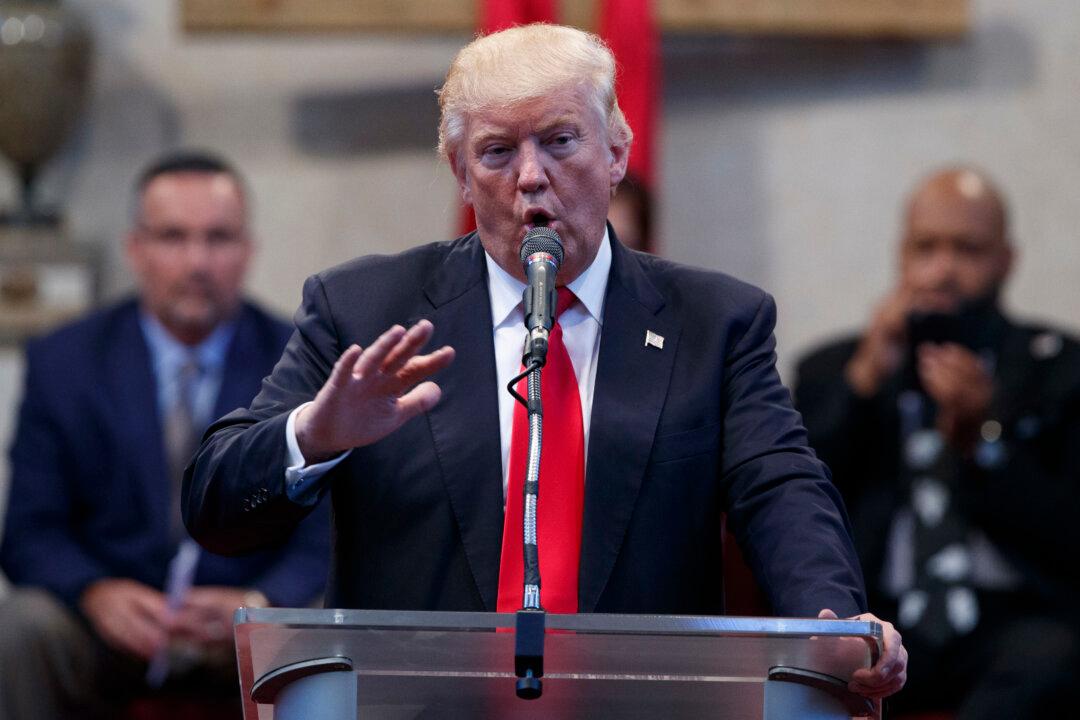CLEVELAND—Donald Trump said he is “very troubled” by last week’s fatal shooting of a black man by a white police officer in Oklahoma, as he made a fresh appeal to black voters Wednesday.
At the end of an Ohio church event organized by members of his diversity coalition, Trump was asked about recent high-profile police shootings in Oklahoma and North Carolina. Trump said 40-year-old Terence Crutcher, who was killed in Friday’s Tulsa, Oklahoma, shooting, “looked like he did everything you’re supposed to do. And he looked like a really good man.”
“This young officer, I don’t know what she was thinking. I don’t know what she was thinking but I’m very, very troubled by that,” Trump said, calling it a “terrible situation.”
Trump, joined by running mate Mike Pence at the Ohio event, has routinely praised police officers in his speeches to supporters. But after reading from notes about the role of the black church in the civil rights movement and vowing to help struggling black Americans, Trump questioned the Tulsa officer’s reaction in shooting Crutcher, who was unarmed.
Video of the altercation, which Trump cited, shows two officers approach Crutcher. One officer deploys a Taser. Shortly after, with Crutcher’s hands raised in the air, the second officer shoots him. That officer, Betty Shelby, is white. The case has prompted the Justice Department to investigate.
Democratic nominee Hillary Clinton has made curbing gun violence and police brutality a central part of her candidacy. She has campaigned alongside a group of black women called the “Mothers of the Movement,” who advocated for more accountability and transparency by law enforcement. The group includes the mothers of Eric Garner, Trayvon Martin and Michael Brown, black victims of high-profile killings.
Addressing the North Carolina and Oklahoma shootings on Twitter on Wednesday, Clinton wrote, “Keith Lamont Scott. Terence Crutcher. Too many others. This has got to end. -H”
Trump’s meeting, organized by Darrell Scott, a prominent black pastor and top Trump supporter, came after street demonstrations continued into the early hours of Wednesday in Charlotte, North Carolina. On Tuesday, 43-year-old Keith Lamont Scott was fatally shot by Charlotte police officer Brentley Vinson, who is black. Officers say Scott was armed and posed a threat. Police used tear gas to disperse protesters during the demonstrations that left about a dozen officers injured.
During the question-and-answer session at the church, Trump said he was a “tremendous believer in the police and law enforcement, because we need that for our society.” But he said law enforcement was also troubled by the police-involved shootings, adding, “People that choke, people that do that, maybe they can’t be doing what they’re doing.”
Trump has also tried to broaden his appeal to minority voters in recent weeks and cut into Democrats’ massive advantage among black voters, a key group of the coalition that twice elected President Barack Obama. In Cleveland, Trump reiterated his plans to help inner cities rebuild and asked African-Americans to consider voting for him. “What do you have to lose? It can’t get any worse. It really can’t. The inner cities cannot get much worse,” he said.
That pitch has offended many black voters, who have recoiled at his grim depiction of life in minority communities, including his false claim that certain inner cities are more dangerous than Afghanistan.
Clinton, meanwhile, was campaigning in Orlando, Florida, later Wednesday. She planned a speech focused on how the economy can work for people with disabilities, an implicit poke at Trump’s much-publicized mocking of a disabled journalist during a rally last year.
Clinton’s campaign said she would “make the case for building an inclusive economy that welcomes people with disabilities, values their work, rewards them fairly, and treats them with respect.”
Struggling to pull ahead in a close race, Clinton has embarked on an effort to highlight her record and her positive proposals, rather than just attacking Trump She spoke about faith in Kansas City recently and stressed her plans for younger voters in Philadelphia this week.
But the Florida event will allow Clinton to contrast her stance on helping the disabled with Trump, who mocked New York Times reporter Serge Kovaleski during an event in South Carolina last year. Kovaleski has a congenital condition that restricts joint movement,
At the time, Trump was taking issue with a story Kovaleski had written for The Washington Post. Video of the Trump address has been a mainstay in Clinton’s campaign ads.
Trump later said he was only acting as a flustered reporter, not one with a disability, and he denied knowing Kovaleski, who had covered him for years.





